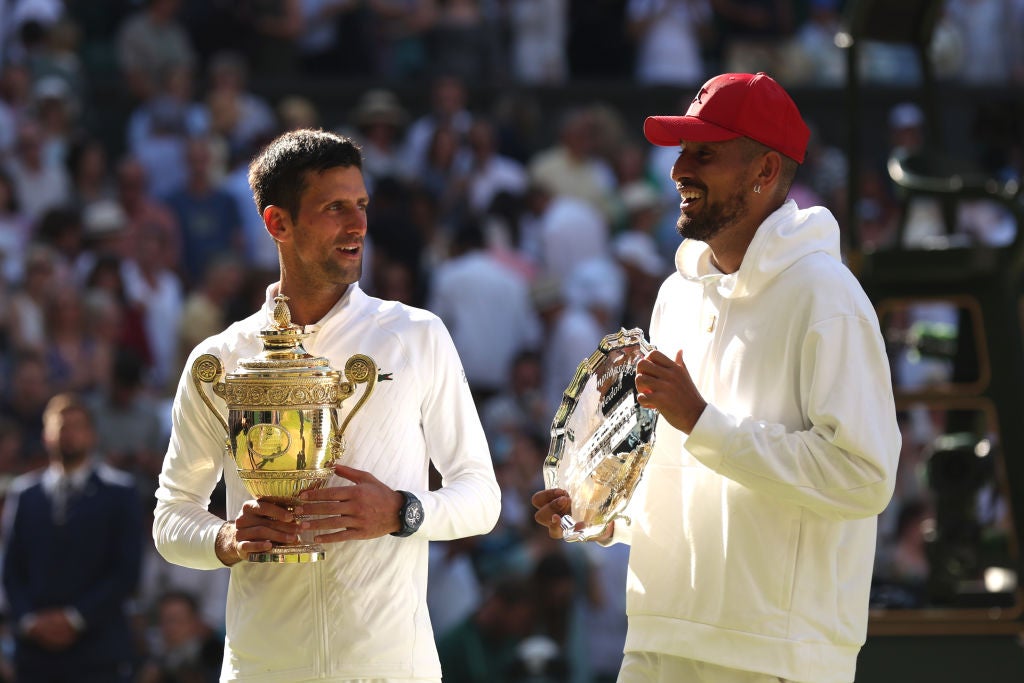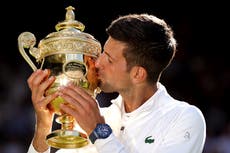Novak Djokovic’s Wimbledon triumph shows Nick Kyrgios what is required for grand slam success
Kyrgios could not afford to offer Djokovic a chance in the Wimbledon final, let alone the beginnings of an unravelling
Once the dust had settled on his seventh Wimbledon title, Novak Djokovic remained just as clinical in identifying the moments the match began to turn. Djokovic had steadied after dropping the opening set to Nick Kyrgios, like a machine analysing its opponent’s serve and learning new behaviours, and after levelling the match he continued to tighten his grip with a faultless display of hitting from the baseline. The key breakthrough in the third, though, was “presented” to him.
Kyrgios, still reeling from a missed opportunity to break Djokovic from 0-40 at the end of the previous set, looked to be cruising to an important hold at 4-4 in the third. For a player who through the tournament had held 97 per cent of his service games after winning the opening point, being 40-0 up should have been an unassailable lead. But the irritation built, a backhand into the net was followed by a double fault, and at deuce the sight of Kyrgios grumbling to his box was like waving a red flag in front of the bull.
“He knew on this stage, when Nick starts to talk, he’s going to be vulnerable,” Djokovic’s coach, and the former Wimbledon champion, Goran Ivanisevic revealed. “I felt maybe that’s the moment where I could break his serve, which happened,” Djokovic shrugged. “It was a huge momentum shift.”
Djokovic, by then, had found a remarkable level. The 35-year-old made just one unforced error throughout the third set and did not give away a single point on the forehand side. The gambles he was taking on the Kyrgios serve were increasingly coming up in his favour, the returns sliced and blocked deep into the court. Still, with a weapon like the Kyrgios serve, it remained close. “Even,” Djokovic suggested. But, he added, “We know that he has his ups and downs in the match.”
Kyrgios quite rightly took pride in his run to the Wimbledon final, and the confidence it will give him moving forward. He had put himself in a position to threaten Djokovic after taking a brilliant first set, but appeared to develop a newfound respect for the 21-time grand slam champion that he did not go through similar dips of emotion. “In big moments, it just felt like he was never rattled,” Kyrgios said. “I feel like that’s his greatest strength.”
There was, though, a reluctance to learn from it. In one of several contradictions throughout his post-match press conference, Kyrgios then labelled a question suggesting that he could look to emulate Djokovic by improving his own composure as a “dig”. “I think the other 126 players in the draw could improve their composure,” Kyrgios replied, but when he hit “rocky” spells in the match it was the Australian who reacted by looking to blame anything and everything around him.
Kyrgios, it seems, was not prepared for there to be choppy waters, even as he came into a match against one of the best players of all time and a serial champion carrying a 27-match win streak at Wimbledon. “In best-of-five against these guys, you feel like you win the first set, you still have to climb up Mount Everest to get it done,” Kyrgios said, and yet the unravelling began early in the second set and at the first signs of trouble when Djokovic broke to love.

It remained an absorbing contest and while it can be hard to take your eyes off Kyrgios at times amid the invention and spontaneity of play, as well as the antics at the back of the court, the sight of Djokovic adjusting to his opponent and breaking down the serve was just as compelling.
Djokovic has a knack for producing important victories in SW19, and this seventh title may rank above the rest. His 2011 victory, his first at the All England Club, was followed by his ascent to world No 1. In 2014, his second ended a streak of three grand slam final defeats in a row, while his 2018 win was his first since undergoing elbow surgery, signalling the start of his resurgence after two years without a title.
“Wimbledon historically has always come at such important stages of my life and my career,” Djokovic said, and this time it arrived after the turmoil of Australia at the start of the year, when the Serbian was deported from the country following a row over his Covid-19 vaccine exemption. “Mentally, emotionally, I was not at a good place,” he admitted, but the mask of invincibility that had slipped has now firmly been restored.
But while in previous years it may have signalled the start of another dominant run, this time there is only uncertainty. Djokovic remains in limbo, hoping to hear “good news” from the United States and the country opening its borders to non-vaccinated travellers. There is the three-year ban from Australia, too, that automatically follows a deportation. If enforced, he may not return to a grand slam until the French Open in May 2023.
“It is,” Djokovic agreed when it was put to him that he now faces a “weird situation”, and after the sanctuary of Wimbledon the path from here appears complex once again.
Join our commenting forum
Join thought-provoking conversations, follow other Independent readers and see their replies
Comments


Bookmark popover
Removed from bookmarks